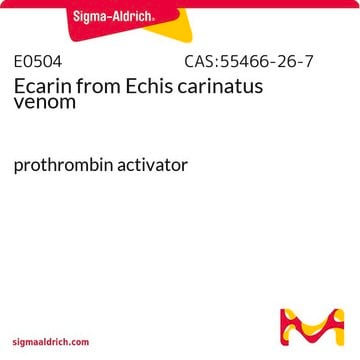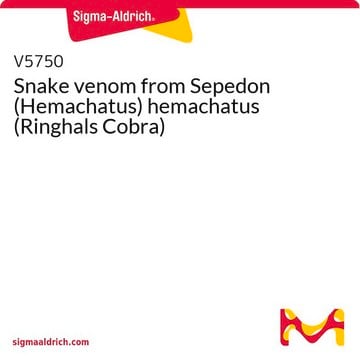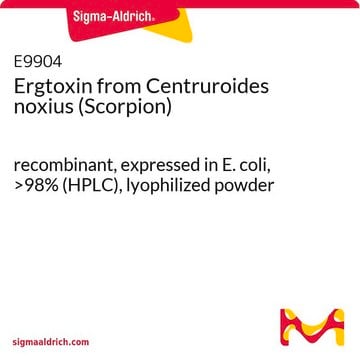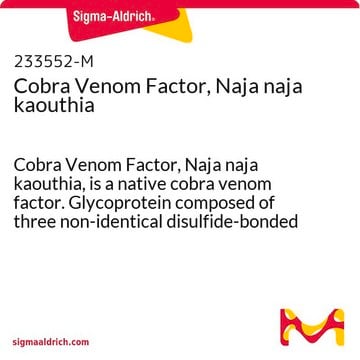V8250
Snake venom from Echis carinatus
Synonym(s):
Saw-scaled Viper
Sign Into View Organizational & Contract Pricing
All Photos(1)
About This Item
UNSPSC Code:
12352200
NACRES:
NA.25
Recommended Products
Quality Level
application(s)
metabolomics
vitamins, nutraceuticals, and natural products
storage temp.
−20°C
Application
Snake venom from Echis carinatus (Indian saw-scaled viper) which acts primarily on fibrinogen may be used as a source of anticoagulation factors and the prothrombin activator ecarin. It may also be used as an immunogen.
Signal Word
Danger
Hazard Statements
Precautionary Statements
Hazard Classifications
Acute Tox. 2 Dermal - Acute Tox. 2 Oral
Storage Class Code
6.1A - Combustible acute toxic Cat. 1 and 2 / very toxic hazardous materials
WGK
WGK 3
Flash Point(F)
Not applicable
Flash Point(C)
Not applicable
Certificates of Analysis (COA)
Search for Certificates of Analysis (COA) by entering the products Lot/Batch Number. Lot and Batch Numbers can be found on a product’s label following the words ‘Lot’ or ‘Batch’.
Already Own This Product?
Find documentation for the products that you have recently purchased in the Document Library.
Isolation and partial purification of anticoagulant fractions , from the venom of the Iranian snake Echis carinatus.
Babaie M, Zolfagharian H, et al.
Bioengineered (2012)
Effects of snake venom proteases on human fibrinogen chains.
Cortelazzo A, Guerranti R, Bini L, et al.
Blood, 8, 120-125 (2010)
K Paul et al.
Toxicon : official journal of the International Society on Toxinology, 50(7), 893-900 (2007-08-08)
High titer antibodies (IgY) were raised in egg yolk of white leghorn chicken (Gallus gallus domesticus) by immunizing with the venom of Echis carinatus (Saw scaled viper or carpet viper), an Indian venomous snake belonging to the family Viperidae. The
Riley B Peacock et al.
Biochemistry, 57(18), 2694-2703 (2018-04-11)
Thrombin normally cleaves fibrinogen to promote coagulation; however, binding of thrombomodulin to thrombin switches the specificity of thrombin toward protein C, triggering the anticoagulation pathway. The W215A thrombin mutant was reported to have decreased activity toward fibrinogen without significant loss
John Kim et al.
Xenobiotica; the fate of foreign compounds in biological systems, 45(8), 663-671 (2015-02-13)
1. The safety, tolerability, pharmacokinetics, pharmacodynamics, and food effect of LB30870, a new selective thrombin inhibitor, were studied in 16 healthy men. 2. A double-blind, placebo-controlled single ascending dose study was done at oral doses of 5, 15, 30, 60, 120, and
Our team of scientists has experience in all areas of research including Life Science, Material Science, Chemical Synthesis, Chromatography, Analytical and many others.
Contact Technical Service









